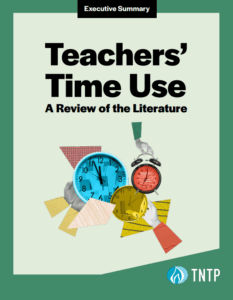On Friday, the federal Education Department (ED) announced its intent to issue new regulations to change how it oversees, regulates and funds teacher preparation programs. The regulations won’t come out until the summer, but the administration has built a substantial paper trail on this issue over the last three years. It seems safe to bet that the proposals will track what the department released in its 2011 roadmap for teacher preparation reform, Our Future, Our Teachers. Though it’s been a few years, the roadmap won support from deans of large university education schools, state education chiefs, and leaders of non-profits, accrediting agencies, and the National Education Assocation.
Based on our reading of Our Future, Our Teachers and Friday’s announcement, here are two goals we expect to be focal points:
Emphasizing Program Outcomes: Today, all approved teacher preparation programs must file annual reports to ED that read like checklists: number of students, number of hours of coursework and dozens of “yes/no” checkboxes that no one ever follows up on.
The department—and, increasingly, members of Congress—want to change these requirements and ask programs to report data that describes the outcomes for each program's teacher candidates. This includes not just their ability to find and keep jobs but also to demonstrate effective practice in the classroom, since we've learned that teachers can be effective even in their first year. It may also mean asking those teachers or their hiring districts whether the program did its job preparing the teacher for success out of the gate.
Information like this isn't just useful for government oversight; it helps teacher candidates make informed choices on where to get their certificates, and could help programs improve.
The department has also said that states should develop systems to identify both low and high performing programs. It has asked states to do this before—presently, states are asked to name low-performers in their annual reports to ED—but few have done so. We hope that ED will propose a regulation that pushes states to meaningfully distinguish between programs that do right by their teacher candidates and future students and those that fall short.
Leveling the Playing Field: Presently, several ED-operated student grant programs have structural problems that hurt teacher candidates.
- First, they can be used only in programs at institutes of higher education, ignoring the weak track record of many of these institutions and the success of many non-university programs (which include programs based in residency programs, charter schools, districts, etc).
- Second, some—such as the TEACH grant—convert to loans if the recipient doesn't fulfill a four year teaching requirement. This is problematic when schools can use the grants as financial aid packages for candidates early in their studies, who aren’t totally committed to a teaching career yet. The schools still get paid; the candidates bear the debt.
With smarter regulations, ED could reduce the likelihood of TEACH grants becoming defacto loans. Such rules would focus the grants on final year students who are truly committed to teaching, and reconfigure grant eligibility to focus only on high quality preparation programs, whether at a university or not. In its announcement last week, ED only committed to using state-developed program ratings as a factor in program eligibility for TEACH grants. Hopefully, when the rules are announced, the department will go further to ensure these federal funds are invested wisely into teachers most likely to succeed once they enter the classroom.
These are the right places for ED to focus. For too long, enrolling in a teacher preparation program was a game of Russian Roulette: candidates had almost no idea whether the program they chose would set them up for success. With its move towards improved regulations, ED has indicated it wants to set a clear standard of quality for prep programs. If all teachers receive the high quality preparation they need and deserve, our chances of having every student benefit from an effective teacher improve. That's a goal we can all get behind.
This is the start of a long process—ED's regulations still have to go through an intra-government review and a public comment before they can be formalized. And the department cannot solve this challenge alone; it needs help from Congress to make even broader changes to the Higher Education Act for its regulatory changes to reach their full effect. But this announcement is an important start, and we applaud the department for following through on its promises from years past.








